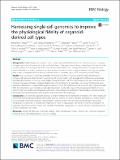Harnessing single-cell genomics to improve the physiological fidelity of organoid-derived cell types
Author(s)
Szucs, Matthew J; Ammendolia, Dustin A; MacMullan, Melanie A; Rakoff-Nahoum, Seth; Mead, Benjamin Elliott; Ordovas-Montanes, Jose Manuel; Braun, Alexandra Provost; Levy, Lauren; Saluja, Prerna Bhargava; Yin, Xiaolei; Hughes, Travis K.; Wadsworth, Marc Havens; Ahmad, Rushdy; Carr, Steven A; Langer, Robert S; Collins, James J.; Shalek, Alexander K; Karp, Jeffrey Michael; ... Show more Show less
Download12915_2018_Article_527.pdf (5.392Mb)
PUBLISHER_CC
Publisher with Creative Commons License
Creative Commons Attribution
Terms of use
Metadata
Show full item recordAbstract
Background
Single-cell genomic methods now provide unprecedented resolution for characterizing the component cell types and states of tissues such as the epithelial subsets of the gastrointestinal tract. Nevertheless, functional studies of these subsets at scale require faithful in vitro models of identified in vivo biology. While intestinal organoids have been invaluable in providing mechanistic insights in vitro, the extent to which organoid-derived cell types recapitulate their in vivo counterparts remains formally untested, with no systematic approach for improving model fidelity.
Results
Here, we present a generally applicable framework that utilizes massively parallel single-cell RNA-seq to compare cell types and states found in vivo to those of in vitro models such as organoids. Furthermore, we leverage identified discrepancies to improve model fidelity. Using the Paneth cell (PC), which supports the stem cell niche and produces the largest diversity of antimicrobials in the small intestine, as an exemplar, we uncover fundamental gene expression differences in lineage-defining genes between in vivo PCs and those of the current in vitro organoid model. With this information, we nominate a molecular intervention to rationally improve the physiological fidelity of our in vitro PCs. We then perform transcriptomic, cytometric, morphologic and proteomic characterization, and demonstrate functional (antimicrobial activity, niche support) improvements in PC physiology.
Conclusions
Our systematic approach provides a simple workflow for identifying the limitations of in vitro models and enhancing their physiological fidelity. Using adult stem cell-derived PCs within intestinal organoids as a model system, we successfully benchmark organoid representation, relative to that in vivo, of a specialized cell type and use this comparison to generate a functionally improved in vitro PC population. We predict that the generation of rationally improved cellular models will facilitate mechanistic exploration of specific disease-associated genes in their respective cell types. Keywords: Single-cell RNA-seq; Chemical biology; Stem cell-derived models; Paneth cell; Intestinal organoid; Intestinal stem cell; Differentiation; Systems biology
Date issued
2018-06Department
Massachusetts Institute of Technology. Institute for Medical Engineering & Science; Massachusetts Institute of Technology. Center for Microbiome Informatics and Therapeutics; Massachusetts Institute of Technology. Department of Biological Engineering; Massachusetts Institute of Technology. Department of Chemical Engineering; Massachusetts Institute of Technology. Department of Chemistry; Massachusetts Institute of Technology. Synthetic Biology Center; Koch Institute for Integrative Cancer Research at MITJournal
BMC Biology
Publisher
Biomed Central Ltd
Citation
Mead, Benjamin E. et al. "Harnessing single-cell genomics to improve the physiological fidelity of organoid-derived cell types." BMC Biology 16 (June 2018): 62 © 2018 Karp et al
Version: Final published version
ISSN
1741-7007